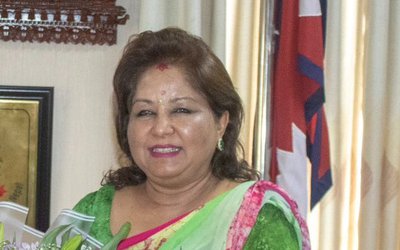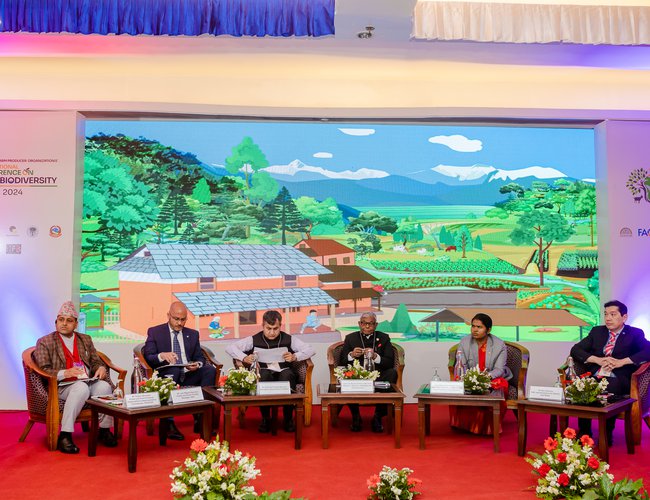
The leaders around the globe gathered to organize the International Conference on Agrobiodiversity 2024, commencing from 9 to 12 April 2024 in Pokhara, Gandaki Province of Nepal. This event aims to exchange innovative traditional and scientific knowledge on advancing agroecological practices, agro biodiverse planting materials, and climate-smart business and finance models that enhance nature and nutrition.
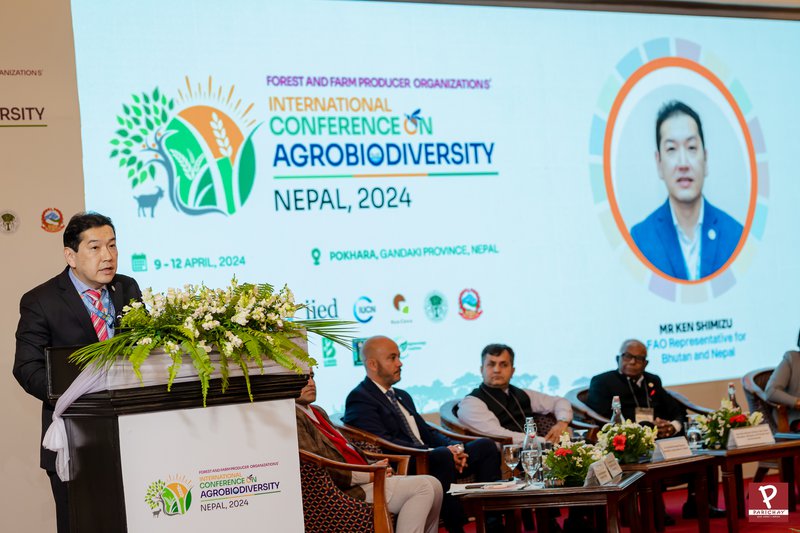
The International Conference, a collaborative effort between the Food and Agriculture Organization of the United Nations (FAO), Ministry of Forests and Environment (MoFE), Ministry of Agriculture and Livestock Development, Federation of Community Forest Users Nepal (FECOFUN), Local Initiatives for Biodiversity, Research and Development (LI-BIRD), Agroecology Coalition, and the International Indigenous Forum on Biodiversity, alongside support from the Forest and Farm Facility (FFF), is proven as strong platform uniting diverse stakeholders, including Forest Farm Producer Organizations (FFPOs), Indigenous Peoples and Local Communities (IPLCs), and various supporting partners to facilitate discussions and innovative solutions aimed at advancing agrobiodiversity, promoting sustainable agriculture practices, and prioritizing inclusive development initiatives.
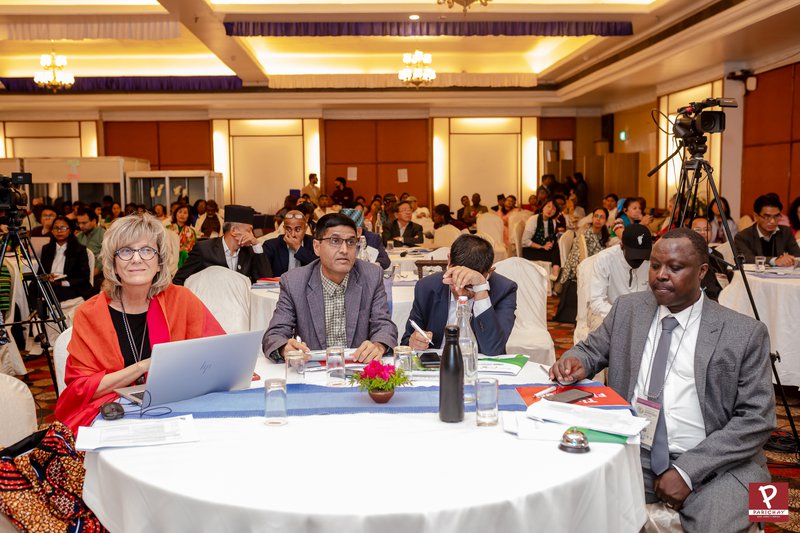
More than 150 representatives from government entities, experts, academia, NGOs, INGOs, private sector, over 30 countries including Belgium, Bolivia, Brazil, Cameroon, Canada, Ecuador, Fiji, France, Gambia, Ghana, India, Italy, Kenya, Liberia, Madagascar, Mali, Mexico, Netherlands, Panama, Peru, Philippines, Rwanda, Spain, Switzerland, Tanzania, Togo, UK, Vietnam, Zambia, Zimbabwe are participating in the conference.
Speaking over the inaugural session, Honourable Nawal Kishor Sah Sudi, Minister for Forests and Environment emphasized the nation's proactive stance towards addressing pressing biodiversity issues, particularly those concerning conservation and habitat preservation. He underscored Nepal's dedicated efforts in combating these challenges, showcasing the country's commitment to environmental agenda and emphasized the ministry's leadership in developing the National Biodiversity Policy and Action
Jwala Kumari Sah, Minister for Agriculture and Livestock Development emphasized the strong collaboration between FAO Nepal, the government, and other stakeholders in advancing Nepal's efforts to promote agrobiodiversity. She elaborated on the policies and program of the ministry undertaken to prioritize this crucial aspect of agricultural sustainability.
Nepal's rich agrobiodiversity is deeply intertwined with the nation's cultural heritage and food security resulting to native crops, promoting sustainable farming practices, and empowering local communities to preserve and transmit traditional agricultural knowledge across generations.
Dr. Govinda Prasad Sharma, Secretary from Ministry of Agriculture and Livestock Development underscored the abundant agrobiodiversity heritage of Nepal and highlighted practices in preserving agrobiodiversity at this conference. He mentioned that Nepal has been committed in promoting traditional farming methods to supporting seed banks and conservation initiatives.
Ken Shimizu, FAO Representative for Bhutan and Nepal emphasized that the conference will contribute to FAO's Programme Priority Areas, focusing on biodiversity conservation, inclusive rural transformation, resilient agri-food systems, and scaling up investment in climate change mitigation and adaptation. He added significance of indigenous and traditional farming systems in preserving agrobiodiversity and genetic resources crucial for resilience against climate change.
FAO Nepal is working with local farmers and indigenous communities in preserving traditional crop varieties. Luis Miguel Aparicio, Manager of Forest Farm Facility (FFF) highlighted (FFF) intervention in conserving agrobiodiversity and collaboration with FAO partners to empower smallholder farmers, indigenous groups, and local communities in sustainable forest and farm management to enhance agrobiodiversity both locally and globally.
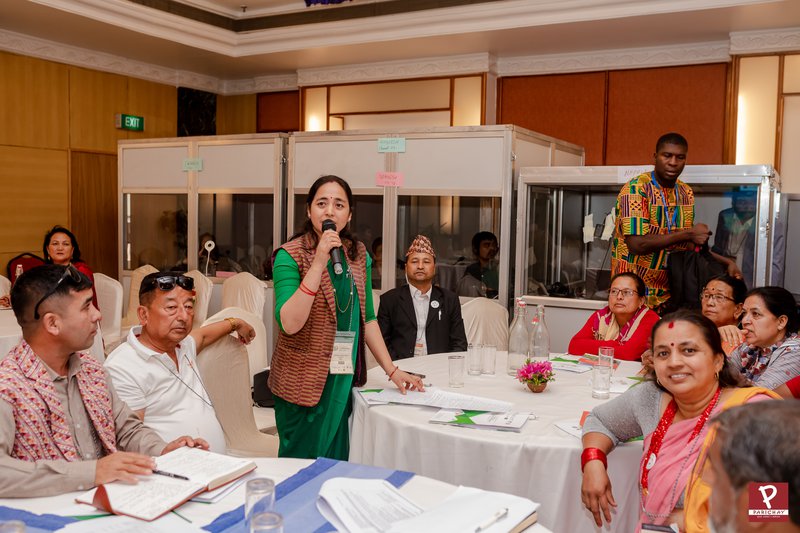
The International Conference on Agrobiodiversity gathers Forest and Farm Producer Organizations (FFPOs), Indigenous Peoples, local community groups, and various stakeholders to exchange knowledge and advance sustainable practices. With a focus on enriching nature and nutrition, the Session 1: Agrobiodiersity- What it is and why it matters., Session 2: How policies shape agroecology approaches that help to protect and manage agrobiodiversity for better or worse, Session 3: Traditional knowledge of agroforestry systems and knowledge exchange practices that maintain agrobiodiversity, Session 4: Seed and farm management techniques and innovations to sustain agrobiodiversity, Session 5: Enterprise innovations that encourage diversification in what is planted and Session 6: Nature finance- improving flows to FFPOs and IPLCS offer delegates the chance to witness innovative agrobiodiversity management practices at different level and shared cases of good practices from FFPOs to enhance resilience, biodiversity conservation, and community livelihoods.
This conference in presence of 200+ participants is strong platform for knowledge exchange and foster collaboration among FFPOs, governmental institutions, the private sector, CSOs and other stakeholders, to create synergies in promoting agrobiodiversity linked to forest and farm value chains.
- The Sentiment Of Monetary Policy Seems Focused On Increasing Eemand: FNCCI President Chandra Prasad Dhakal
- Jul 26, 2024
- Monetary Policy 081/82 Is Making The Economy More Dynamic: Governor Adhikari
- Jul 26, 2024
- Global IME Bank And Shashila Motors Signed Agreement Regarding Electric Vehicle loan
- Jul 26, 2024
- Lok Bahadur Thapa, permanent representative of the UN in New York, was appointed as the Vice President of ECOSOC
- Jul 26, 2024
- Leeladevi Gadtaula Became The First woman Chief Secretary
- Jul 26, 2024






